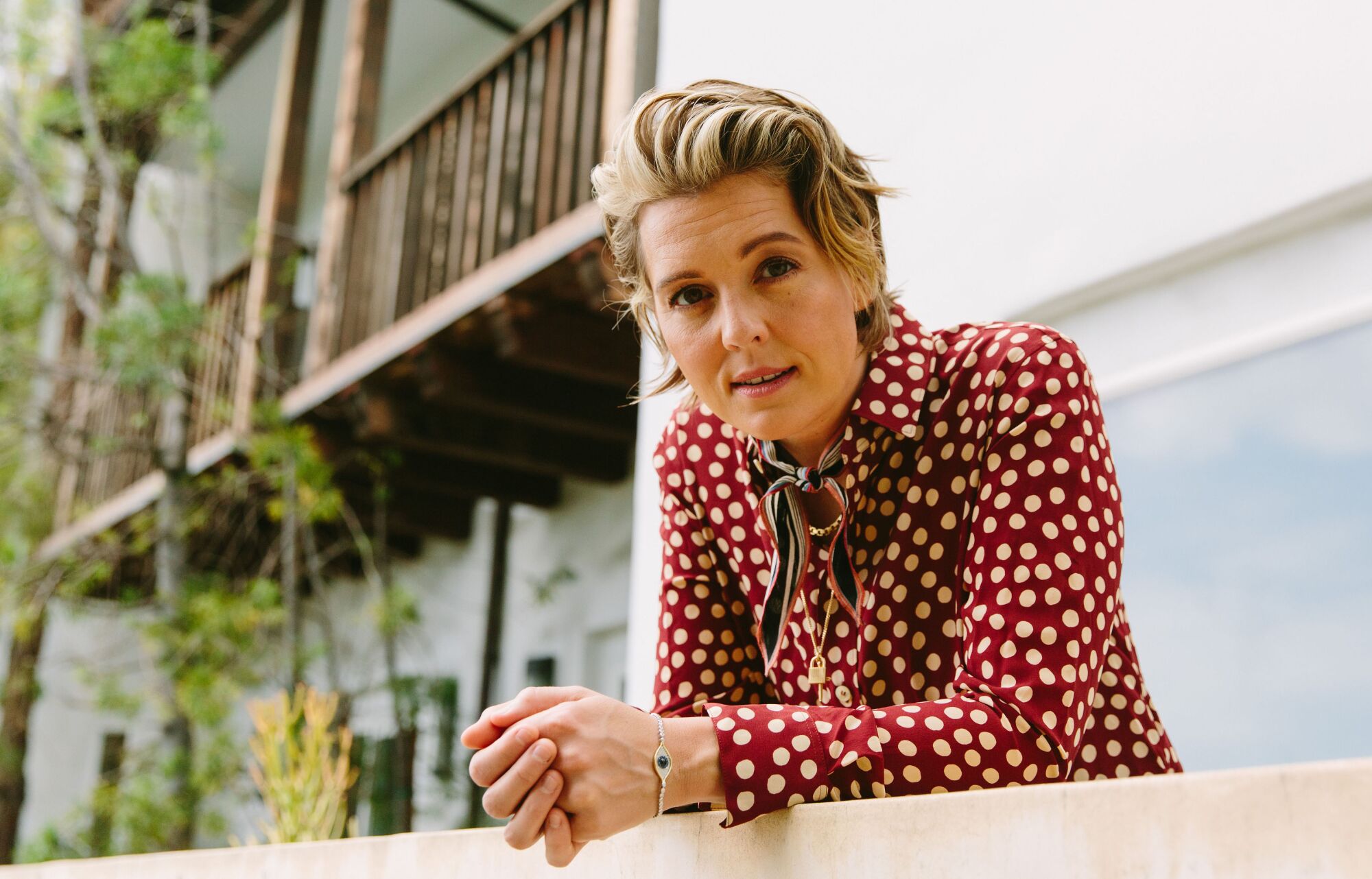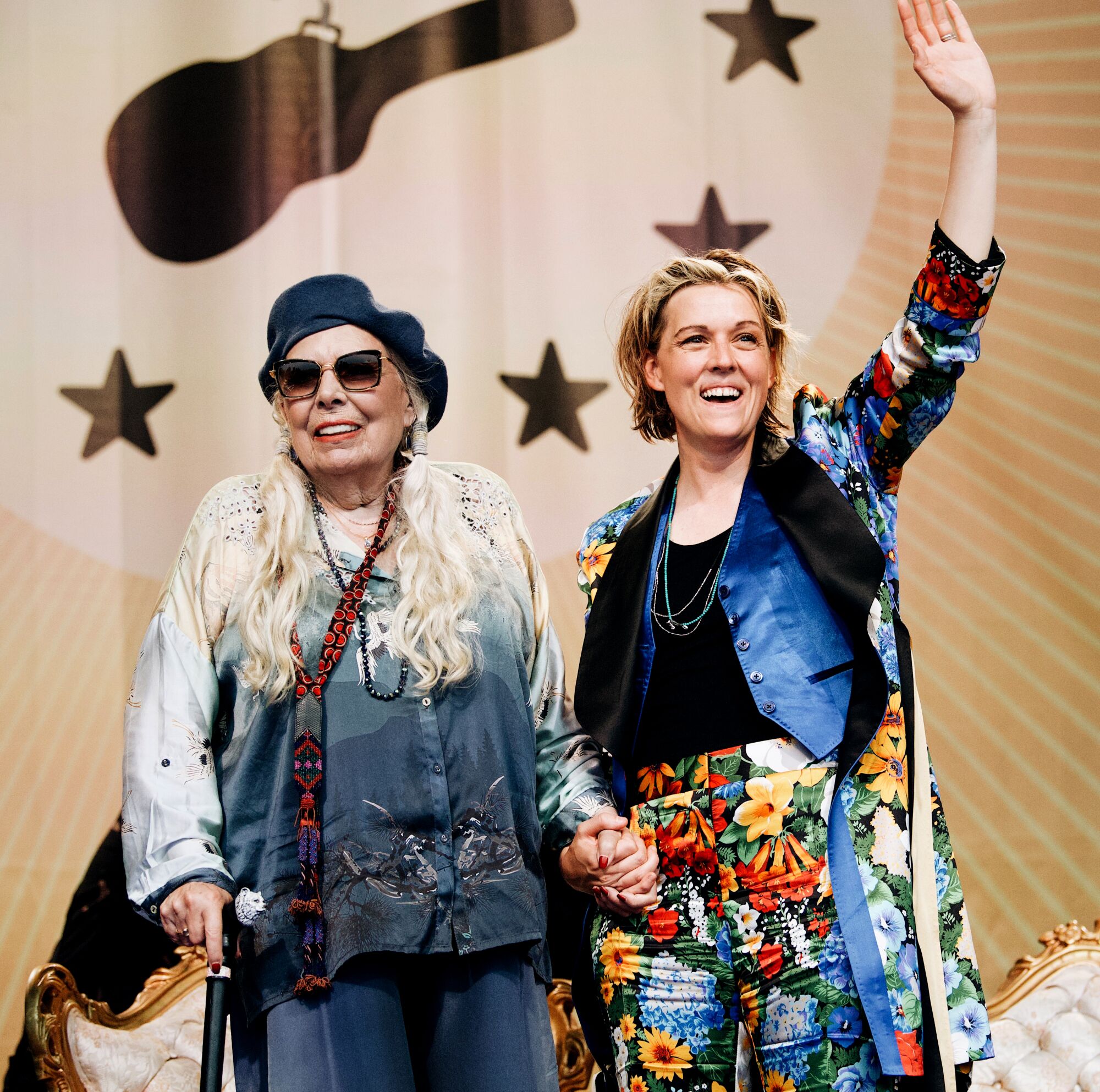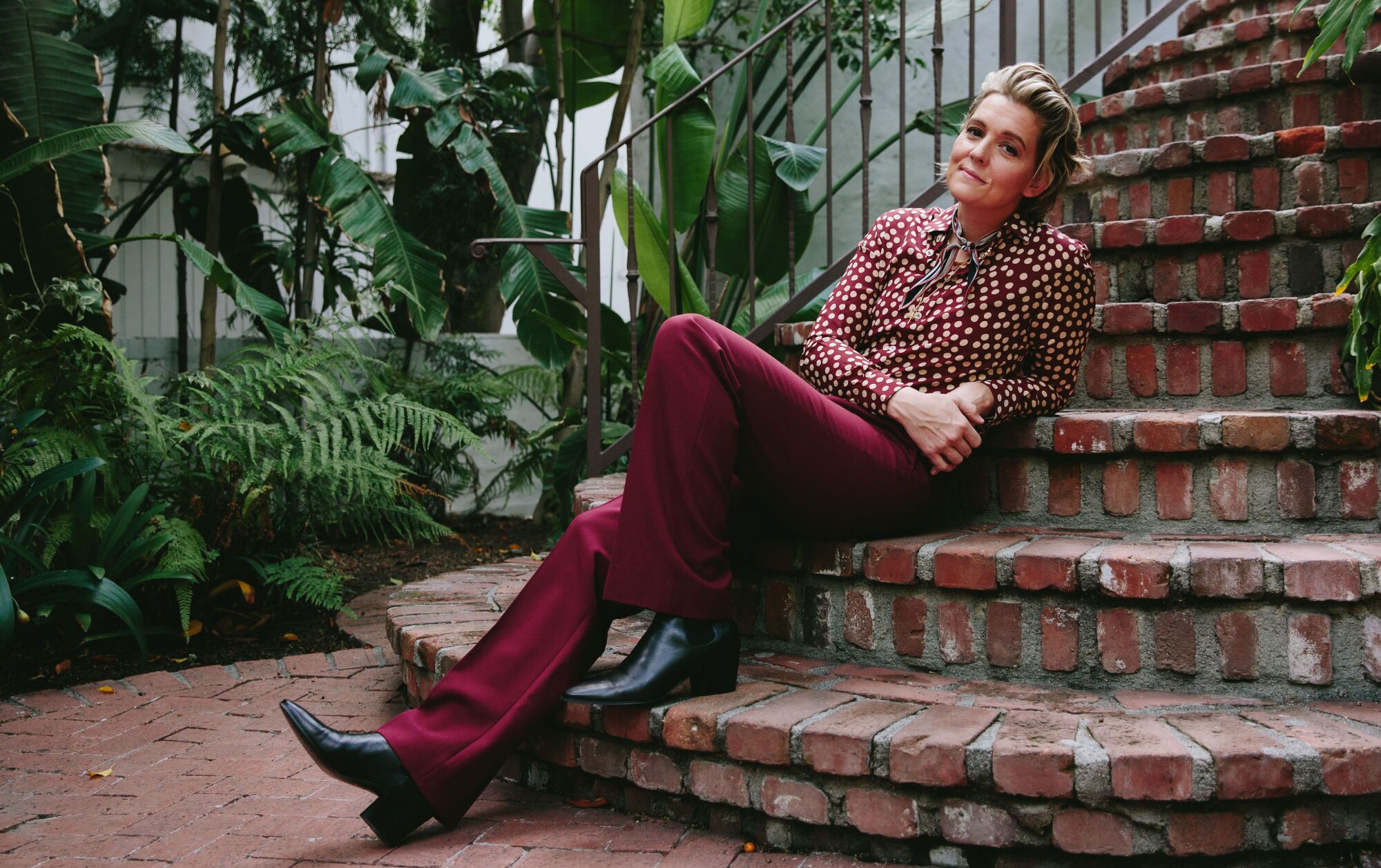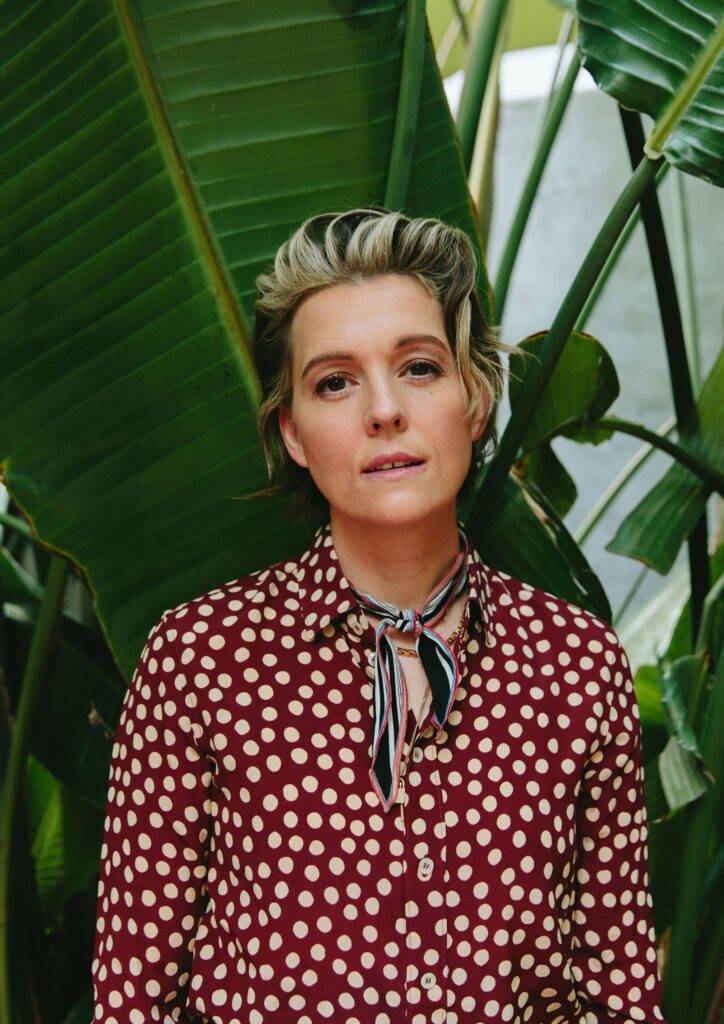Of Joni Mitchell’s set at July’s Newport Folk Festival, Brandi Carlile says, “We had no idea it was going to happen until it did.”
(Michelle Terris / For The Times)
Nashville —
A few hours before we meet at her hotel in Nashville, Brandi Carlile — six-time Grammy winner and bestselling author — was onstage at City Winery doing what any up-and-coming artist in town might do: participating in a good old-fashioned songwriting round. It was a lunchtime event during the roots festival and conference Americana Fest to celebrate Carlile’s new music publishing imprint, Northern Lights, and she brought out singer-songwriters including SistaStrings and Ashley Ray for a song swap, as she watched from a stool. Artist and friend Allison Russell showed up for a duet, and Carlile even persuaded country legend Tanya Tucker — who arrived in a pink embroidered number but didn’t plan on performing — to sing.
“I said, ‘Tanya, you’re in a Nudie suit. You didn’t think you were going to come out here and sing?” Carlile says, sitting on a couch in the lobby in a tan sweatsuit, drinking a tequila cocktail. “And Tanya goes, ‘It’s all I had!’ And then she told some story about winning a bird in a poker game.” She did sing, though, because standing next to Carlile onstage seems to incite that in people: a comfort, a community, a freedom to open your mouth and see what comes out, even if it’s been days or years or, in the case of Joni Mitchell at the Newport Folk Festival this past July, two decades.
Carlile, 41, started Northern Lights with her close friend, music executive Tracy Gershon, early in the pandemic — and between her album “In These Silent Days,” and memoir, “Broken Horses,” it wasn’t like she was short of things to do. But she also didn’t want to officially launch until they had the roster just right. “The first time I ever get a pen in my hand to sign something, I don’t want it to only be white straight people,” Carlile says. She didn’t want it to be all young people, either. Tucker, who usually (and mistakenly) isn’t viewed as a writer, was one of Carlile’s first signings.
At City Winery, Carlile watched Tucker — and SistaStrings and Ray — with that same face we have come to know from when she captured the world’s awe during her 2019 Grammy performance of the misfit anthem “The Joke,” or when she stood alongside Mitchell at Newport, the singer’s first performance in over twenty years, or when she hit that monster note in “Right on Time” on “Saturday Night Live,” a lifelong dream fulfilled. It’s a face of joy, euphoria and bewilderment: her head tips back, her eyes squint to a close, her eyebrows dart up to the sky, her nose wrinkles. It’s there when she’s playing for her buddy Elton John, and it was also there this afternoon, because Carlile is still completely delighted by music.
She’s been thinking a lot about Linda Ronstadt, as she does so many women whom she looks up to as icons. “She went from stadiums to Mexican music because it raised her, and it was fun,” Carlile says. “She didn’t really rank it. I’m not ranking any of it and I don’t know how temporary it is. People always say you meet the same people on the way down that you meet on the way up. And some people are like, ‘aw.’ And I’m like, ‘right on!’”
Carlile is all about her people. Mitchell, Tucker, John, Russell, the roster of Northern Lights and many more. Genre, community, whatever you want to call it, this is where Carlile thrives. “I know how othering it can feel to be in a community you know you aren’t part of,” Carlile says. “And how joyful it can feel to be in one you are. I hate to bring everything back to being gay, but it really is my lens. Queers, we don’t have that luxury of being without protection. We see the genres as a little more comfortable.”
She brings up a line from the original demo for the Highwomen’s “Crowded Table,” written by bandmate Natalie Hemby and Lori McKenna: “I want a world where there are no labels.” Ultimately, Carlile suggested they change it to “let us take on the world.” She couldn’t relate. “I love those two soulful women so much, but I felt the heterosexuality in those lyrics,” she says. “To not have a team is to not have people around to defend you when the s— hits the fan.”

“The higher her star rises, the more of us she brings right along with her,” says Americana artist Allison Russell of Carlile.
(Michelle Terris / For The Times)
Her 2021 record “In These Silent Days” is all about what happens when the s— hits the fan. And that “glamorous Americana rock record,” as she calls it, just got a gorgeous rerelease inspired by her time at Mitchell’s house, called “In the Canyon Haze,” where Carlile gave the songs a Laurel Canyon treatment. It’s not stripped down, but instead a lush reimagining now set in “murky, squishy ‘70s beauty,” that popped into her head recalling the bygone days of the canyon with Mitchell one afternoon, with Mitchell sharing stories of when Mama Cass and friends would jump in the pond with their clothes on.
And then there’s Mitchell herself. Carlile still hasn’t come down from that Newport set, grabbing her iPhone at one point to show off some photos like a parent does a newborn. “If you thought what she did was miraculous, just know it was even more miraculous since we had no idea it was going to happen until it did,” Carlile says.
Few things make her smile like seeing her icons get their due, and her friends get in the door. It’s become a mission, working with Mitchell, Tucker, Sheryl Crow and surely more to come (Joan Jett is on her mind today). “There is this period between the ages of 55 and 70 where women are just wiped off the face of the earth,” Carlile says. “It doesn’t happen as much to the guys. It didn’t happen to Tom Petty or Neil Young. And it’s not that these women are lacking visibility. It’s that they should be in stadiums like the Rolling Stones.”
Carlile attributes her own success in part to the fact that it came when it did — in her late 30s. “‘SNL,’ the Grammys, those were the moments I got to go off the high dive, and I’m 41,” she says. Carlile won her first three Grammys in 2019, two more in 2020, another in 2021, and she’s a favorite for more this year, including maybe producer of the year, non-classical, for her work with Lucius on their album “Second Nature.” Part of Carlile’s mission is to make this idea — success in your 30s, 40s, 50s and beyond — achievable, for marginalized people in particular.
Those in her circle have a term for this work: “B.O.B.,” or “Because of Brandi.” Ali Harnell of Live Nation coined it to explain the “countless goodness that can be traced back to her intentional, unwavering mission to make this world a kinder, gentler, more loving place,” Russell said. “The higher her star rises, the more of us she brings right along with her.”
For Carlile, it’s all about building a coalition that’s greater than its individual parts. “It’s really fascinating to see the tables turning, that we outnumber the problem,” she says. “That makes this a rad time to do this job, even with whatever is going on in the world.”

Joni Mitchell and Brandi Carlile on stage at the Newport Folk Festival.
(Nina Westervelt / Newport Festivals Foundation)
Carlile’s primary way to deal with that — the tumultuous political world — has been her Looking Out Foundation, which her wife, Catherine Carlile, runs. Though focused primarily on displaced people, the organization has also gone into “immediate triage mode for racial justice, reproductive rights, anti-trans and -gay bills, you name it” when needed. “I can’t get into those Twitter fires, though, it’s too traumatic,” Carlile says, talking about her Highwomen bandmate Maren Morris, who, after speaking out on social media about transphobia spread by the wife of country singer Jason Aldean, was in turn called “Lunatic Country Music Person” by Fox News’ Tucker Carlson. “Maren is tougher than me,” she says.
What’s next for Carlile? After spending the night with her kids and wife — it’s their 10th wedding anniversary — maybe a little more rock ‘n’ roll.
“It’s very abstract,” Carlile says. “But every night the song I get the most joy out of playing is ‘Broken Horses,’ and it’s really heavy. And Elton — I am Liza Minnelli level name-dropping here — bought me a Les Paul. He said, ‘I’d really love to see you play this. This is a moment.’” Carlile does a good British accent; Catherine is English. “I see myself leaning into that a little bit more,” she adds. “I’d love half the songs on [a potential next record] to be Led Zeppelin-esque.”
By no means does that indicate that Carlile would leave behind Americana, though. “I mean, it’s still Americana, because guess who was at the Americana Awards?” she says. “Robert f— Plant!”
She thinks back again to last night — to spotting Plant in the crowd, to giving an award to her icons the Indigo Girls, to hugging her friends, to Russell taking top honors for her album “Outside Child.” Those eyebrows start to rise again, the nose wrinkling: Brandi joy face is on its way. “It’s the lyrics of ‘The Joke’ coming true,” Carlile says of the Grammy-winning song where the misfits and underdogs triumph in the end, just by being themselves. She shakes her head, a combo of disbelief and mischievous fight. “Some of us are winning, and we weren’t slated to. It’s happening.”

“Some of us are winning, and we weren’t slated to,” says Carlile. “It’s happening.”
(Michelle Terris / For The Times)

